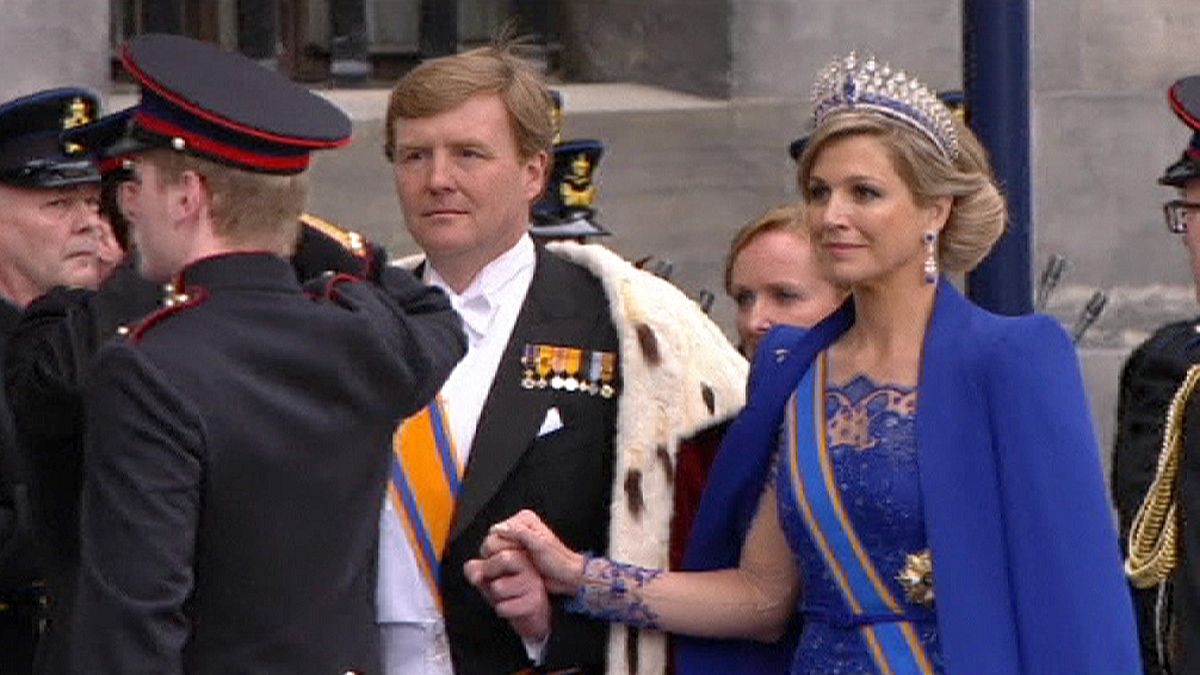A newly-invested king of the Netherlands, Willem-Alexander, has sworn to uphold the constitution and carry on a modern monarchic tradition, like his mother. At 46, he is Europe’s youngest monarch.
He took the vow in the deconsecrated 600-year-old Nieuwe Kerk, where national occasions are traditionally held. There is no state religion, so no cleric puts the crown on the monarch’s head; it sits to the side.
The King wore an ermine cloak used for investitures since 1815. Queen Maxima wore a tiara. She married into the House of Orange in 2002.
MPs and senators then swore an oath to the king.
Prince Charles was there. He also attended Queen Beatrix’s enthronement, in 1980. The some 2,000 guests included many crown princes and princesses from around Europe and the world.
The crowd frequently cheered. Bicycle, car and tram traffic was suspended in the area. Most people were dressed in the traditional national colour, orange.
This contrasted with carpets in blue, laid down to mark the route to the church, for the guests in fine dresses and hats, formal tails or full dress military uniform.
Earlier, Queen Beatrix had signed the abdication document at the Royal Palace. Her son followed, and then his spouse Maxima, the Netherlands’ new queen – born in Argentina.
Beatrix reigned for 33 years. Her mother also left the job to her while still alive, just as her mother had retired in her favour. Willem-Alexander is the first King to hold the Dutch throne since the death of his great-great grandfather William III in 1890. The monarchy in the Netherlands today enjoys a 78 percent public approval rating. Parliament has mostly emptied the throne of political power.
The Dutch now have a new royal family. Their sovereign is a specialist in water management, in a country that lies mostly below sea level. Maxima is a trained economist and was an investment banker working in New York when the pair met.
The king and two queens stepped out onto the balcony, in front of around 25,000 fans in Dam Square. The couple’s three young daughters, Catharina-Amalia (who is next in line to reign), Alexia and Ariane waved too.
Beatrix, now retired, at age 75 takes the title ‘Princess’.
To give us an insight into the meaning of such an event, euronews spoke to Max van Weezel, a journalist with the Dutch weekly newspaper Vrij Nederland.
Olaf Bruns, euronews: “Max, what kind of changes are to be expected with the new king, both in presentation and style, and in the way the royals want to be perceived?”
Max van Weezel, Vrij Nederland: “I think we will see a monarchy with better communication, with much more visits to the population. Queen Beatrix was respected but not very loved by the people, not very popular. She was called the “Ice Queen”, She was very distant with the media and the people. So, I think we will see a revolutionary change now. They will come into the 21st century.”
euronews: “Also formally, the political role of the monarch was recently reduced, wasn’t it?”
Max van Weezel: “It’s not such a powerful position anymore. As a matter of fact, only last year, the Queen was thrown out of forming the new government, which she used to lead, and now parliament did it itself. The king is still a member of government, he signs all the laws and all the measures, but this could change. Willem-Alexander has said that if parliament wants this to change, it’s no problem. So, he could end up as a national master of ceremonies only and not a political factor.”
euronews: “The Netherlands seemed a divided country during the past decade, there has been harsh debate over the European Union, over immigration, over what was important here: tolerance – now, as a strong symbol. Does the new king the ability to bridge those gaps?”
Max van Weezel: “One of the problems in the Netherlands over the last decade is that the monarchy has been in favour of pro-European cooperation, development aid to Third World countries, environmental issues, while a lot of politicians have been against. The big question now is: does Willem-Alexander want to make his views heard or will he remain silent?”
euronews: “But how can he do so if he’s not really politically relevant any more?”
Max van Weezel: “Well of course, he has a sort of moral role in society. For example, his mother Queen Beatrix had an annual television interview in which she gave her views on Europe, on tolerance in society and not all politicians liked what she was doing, but I hope the new king will do it as well.”
euronews: “Royal families all over Europe have to struggle with scandals every now and then. How is the Dutch royal family perceived?”
Max van Weezel: “They are loved, most people support the monarchy, a strange kind of monarchy. But in reality we are a republic with someone with a crown. We have a lot of republican features as well. There were debates on the house that Willem-Alexander and his wife Maxima wanted to buy in Mozambique, near to some millionaires, like the owner of Pret-a-Manger in London, and some jet-set people. And in the end, the government said you shouldn’t buy this house.
“There are debates over the monarchy’s fiscal roots going through the islands of Guernsey or Jersey (off-shore accounts). There are debates over the wages they get, planes they use and I think politicians want them to have a more sober life than they’ve led during the two last centuries.”
